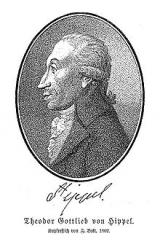- |
User Links
Theodor Gottlieb von Hippel › Texts

www.wikipedia.org
| Short Name: | Theodor Gottlieb von Hippel |
| Full Name: | Hippel, Theodor Gottlieb von, 1741-1796 |
| Birth Year: | 1741 |
| Death Year: | 1796 |
Hippel, Theodor Gottlieb von, son of Melchior Hippel, rector of the Latin school at Gerdauen, in East Prussia, was b. at Gerdauen Jan. 31, 1741. He entered the University of Königsberg in 1756 as a student of theology, where he became an ardent disciple of Kant, and then, in 1762, turned to the study of law. In 1765 he became an advocate in Königsberg; in 1772, Town Judge; 1780, Burgomaster and Director of Police; 1786, Geheim Kriegsrath and City President. He died at Königsberg, April 23, 1796 (Koch, vi. 301-309; Allgemeine Deutsche Biographie, xii. 463-66).
In his writings Hippel's great aim was to popularise and apply the ideas of his master Kant. In his inner life he was a combination of contradictions; on one side of a wonderful fervour of devotion and communion with the unseen; and on the other ambitious, miserly and worldly. His hymns, written in the manner of Gellert, and almost all composed 1767-60, appeared mostly in his Geistliche Lieder, Berlin, 1772, and were reprinted with additions in vol. viii. of his collected works (14 vols., Berlin, 1827-37). Two have passed into English.
i. Gott hab' ich mich ergeben. Resignation. 1772, p. 44, in 7 stanzas of 6 lines, entitled "Submission to the will of God"; thence in the Berlin Geistliche Lieder, ed. 1863, No. 908. In the Berlin Gesang-Buch, 1829, No. 581, altered to "Dir hab ich mich ergeben." The only translation in common use is:—
To Thee, 0 Lord, I yield my spirit . Thine . A free translation of stanzas i., ii., v.; vii., by R. C. Singleton, as No. 271, in the Anglican Hymn Book, 1868.
ii. Jetzt leb’ ich, ob ich Morgen lebe. Preparation for Death. 1772, p. 39, in 6 stanzas, entitled "In recollection of Death." In the hymn-books sometimes repeated as in the original, sometimes as Noch leb ich, or as Heut leb ich. Translated as: (1) "Now I live; but if to night," by Miss Warner, 1858, p. 305. (2) “Though still I live, I know not when," by Dr. G. Walker, 1860, p. 96. [Rev. James Mearns, M.A.]
-- John Julian, Dictionary of Hymnology
| Texts by Theodor Gottlieb von Hippel (6) | As | Authority Languages | Instances |
|---|---|---|---|
| Dziś jeszeze żyję | Theodor Gottlieb von Hippel (Author) | Polish | 2 |
| Gott hab' ich mich ergeben, In diesem Pilgerleben | Th. G. v. Hippel, geb. 1741 (Author) | German | 6 |
| Ihr, die ihr mich verfolgt und schmäht | Theodor Gottlieb von Hippel (Author) | German | 2 |
| Noch [Jetzt] leb' ich; ob ich morgen lebe? | T. G. v. Hippel, 1741-1796 (Author) | German | 10 |
| Now I live, but if tonight | Theodor Gottlieb von Hippel (Author) | 1 | |
| Wann, Herr, einst die Posaune ruft | Th. G. v. Hippel (Author) | German | 7 |


 My Starred Hymns
My Starred Hymns


